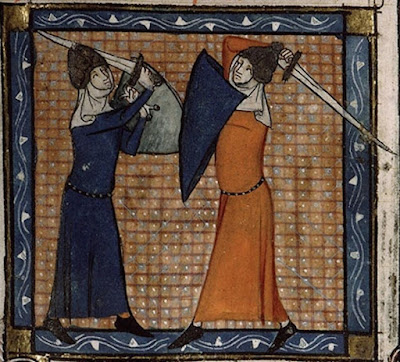Summer 1296, Robert of Artois leads a French army to conquer what remains of English-held Gascony (I'll write in the present tense for a bit of immediacy).
Artois has been granted viceregal authority by his sovereign, Philip the Fair, throughout most of southern France. He has lost no time in preparing for the campaign; no expense or detail has been spared, down to ordering special cloths and saddles from Saloman Boinebroke, a merchant of Douai, to be sent with all speed to Gascony.
The French advance quickly through the south. The march takes them through Auvergne into Poitou, Limousin and Angoumois, reaching Angouleme on 28 April. En route Artois collects more troops and summons the local nobility to serve for at least two months in the host. He crosses the frontier into Gascony in mid-May.
Artois must capture the main English strongholds of Bourg and Blaye in the north, and Bayonne in the south. If these fall, the lesser towns and strongholds still in English hands will soon follow. Artois chooses to concentrate on Bourg. The town, on the upper Gironde river, is held by a mix of English and Gascon men-at-arms. Taking it will be no easy task. The French commander hires stone-cutters to make stones for the bombardment, and workmen to construct a siege engine.
Meanwhile the French navy attempts to blockade the Gironde. Despite the large sum of 23, 141 livres tournois spent on this operation, it fails to repel a supply fleet rushed over from England by Edward I. This delivers much-needed supplies of corn, hay, beans, bacon and other victuals to the garrison.
Artois and his men suffer in the extreme heat. On 28 April his physician is ordered to treat members of the count's household, stricken with disease. Camp fever and dysentery run riot in the French army. Throughout May-July, at least a dozen epidemics are reported. Finally, on 2 July, Artois himself falls sick.






